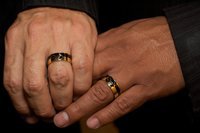In US, gay students welcomed with open arms
 The US Elmhurst College officially became the place where sexual minorities are very welcome. Starting from 2012 academic year, applicants will be asked if they belong to the LGBT community. The answer "yes" would guarantee multiple perks for future students, including the ability to receive a scholarship that will cover one third of the tuition fee.
The US Elmhurst College officially became the place where sexual minorities are very welcome. Starting from 2012 academic year, applicants will be asked if they belong to the LGBT community. The answer "yes" would guarantee multiple perks for future students, including the ability to receive a scholarship that will cover one third of the tuition fee.
This new question on the application is not mandatory, and prospective students are not forced to answer it. The administration of the school says that they simply want to differentiate the minority student community and make the school comfortable for everyone, but adds that students who respond positively can count on a decent stipend. However, the injustice is unlikely because approximately 60 percent of students receive some sort of scholarship. Maybe this is why the college is not afraid to anger the "traditional" students who may be offended that their fellow students receive a scholarship just because they share bed with people of their own gender. Much more important, according to the college representatives, is the fact that this question will help develop programs and establish support groups to better adapt the minority students in the new location.
Elmhurst College is the first in the United States that included the question in the application. Other schools have certain procedures that allow gay people to identify themselves, but they are not as straightforward.
For example, at the University of Pennsylvania future students in their exam essays may indicate that they are advocates of same-sex love, and get some help from a mentor. The American non-governmental organization that deals with precisely the problems of homosexual students for many years has been trying to convince the universities of the country to include the question of the orientation in applications, but so far without success.
However, looking at the struggle of the LGBT community in the U.S., it becomes obvious that the day when the local high schools have to include the question in the application will come. It is sufficient to mention the U.S. Army and the famous Don't ask, Don't tell proposition.
From 1993 to the end of 2010 a rule was active in the Armed Forces of the United States according to which gays and lesbians were allowed to serve in the army, but were forbidden to disclose their sexual orientation, and military commanders - to ask questions about it. In December of last year, Barack Obama signed a law that allowed gay people to openly serve in the army. The ruling applies to both men and women.
At the same time the U.S. President noted that major leaders of the Pentagon, including Defense Secretary Robert Gates, believe that the new practices will not damage the effectiveness of the American Army, and added that the decision to abolish the rule "Don't Ask, Don't Tell" will allow the Army to remain strong, and the country to live in accordance with its values.
In total, according to the Center for Sexual Minorities with the University of California, Santa Barbara, 65,000 gays and lesbians are hiding their sexual orientation in the U.S. Army. In April of this year, California Senate by 23 votes to 14 passed a bill that requires teaching "the history of homosexuals" starting 2013-2014 academic year. In addition, schools will not be allowed to use any materials that contain disapproval of homosexuality. In July, the respective document was signed by Gov. Jerry Brown. Soon students in public schools of California will have classes where they will be taught about the role of sexual minorities in the country's history.
The opponents of this policy argue that the minorities have failed to convince the general public that their relationships are the norm, and are now trying their luck with younger generation. Children can be persuaded to do anything with the right approach. Many resent the fact that, first, elementary school students will talk about not so childish things. Secondly, taxpayers, many of whom do not believe gay people to be a norm say that they will have to pay for the stories about the "normality" of same-sex relationships. However, the anger of the intolerant voters does now bother the lawmakers.
Ksenia Obraztsova
Pravda.Ru
Subscribe to Pravda.Ru Telegram channel, Facebook, RSS!





